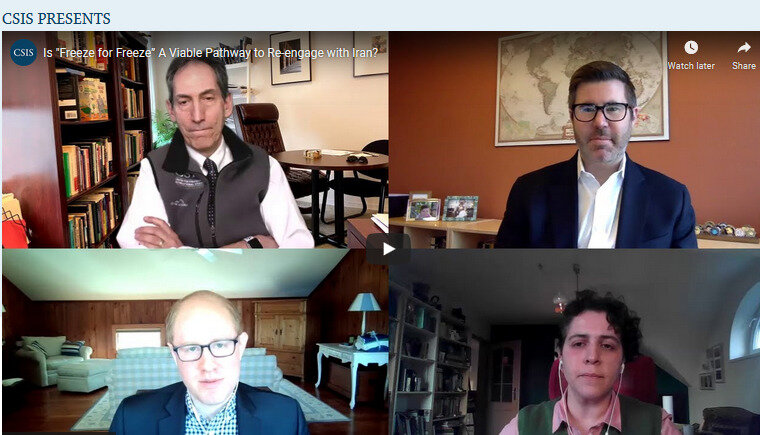CSIS: Issue linkage to secure Iran’s commitment

TEHRAN- The Center for Strategic and International Studies (CSIS), the number one think tank in the United States across all fields in 2019, conducts policy studies and strategic analyses of political, economic, and security issues throughout the world. It publishes numerous reports about the Islamic Republic of Iran as a permanent key area of focus for the U.S.
While the Biden administration explores ways to reengage Iran over its nuclear program, CSIS has addressed the issue from different aspects.
In this regard, in an event held on February 24, CSIS elaborated on the "Freeze for Freeze” initiative as one of the approaches which some experts believe will suit the best for the U.S. to adopt in the future talks. According to CSIS, in the "Freeze for Freeze”, “Iran would freeze aspects of its nuclear activities in exchange for increased access to money.”
In such an environment, Eric Brewer, Hannah Kavain, and Henry Rome elaborated if “Is ‘freeze for freeze’ a viable pathway to re-engage with Iran?"
U.S. sanctions to continue in the immediate future
To discuss the issue from a technical perspective, Brewer, the deputy director of the Project on Nuclear Issues at CSIS, mentioned the Iranian parliamentary law called “Strategic Action to Lift Sanctions and Protect the Interest of Iranian Nation”. On February 23, the Iranian government started to suspend the Additional Protocol to the NPT in response to the abrogation of the international nuclear agreement (JCPOA) by the Trump administration in May 2018 and imposition of the harshest ever sanctions in history.
Brewer claims that since the passage of the parliamentary law in December, “Iran is playing hardball a little bit more.”
He reminds that the U.S. under the Trump administration appeared as the aggressor actor vis a vis the Iranians in terms of the JCPOA, but now it seems that the situation is on the verge of change. He argues that “Iran is going to be in those shoes and it's going to lose its status as the aggrieved party.”
Henry Rome believes that unless there is progress on the diplomatic front, the U.S. sanctions are going to be kept in place in the immediate future. He points out that Iranians do not intend to appear that they need to conclude a deal more than the United States.
Tehran views this integral to maintain its leverage at the negotiation table, Rome opines.
To elaborate on plausible steps that Biden can take to reverse the mistrust that's built up under Trump, Brewer points out the snapback mechanism and restrictions on Iranian diplomats as some issues that Biden can use to make a positive gesture. Also, waiving sanctions on certain types of nuclear cooperation projects that were permitted under the JCPOA can contribute to “normalizing the tensions” among two capitals, the expert adds.
However, CSIS emphasizes that it sounds strange to get back to the negotiations and try the “freeze for freeze” deal as the first option, so the first option is to test the water to see if the two parties will make it to return to the deal or not.
Focus on how to bring Iran to the table
To get back to the status quo ante, Rome stresses, the U.S. should think about any move “in the narrow context of ‘what do we need to do to bring Iran to the table’ and nothing more.”
Therefore, he underlines that the fundamental goal for the Oval Office is to get back to negotiations whereby the parties can deliberate about smaller steps to build confidence.
Kaviani, a journalist with RadioFarda, who has closely followed the nuclear negotiations, believes that “it was not that much of a crisis in the past two, three weeks as it was portrayed.”
She argues that Tehran does want the JCPOA to be revived and is ready for talks to negotiate the way back to the deal.
In this context, Rome argues regardless of the political attitude of the future president of Iran, Tehran has made a strategic decision to get back to the JCPOA. Therefore, he stresses, the U.S. should not get into a “trap” to consider the June elections as a deadline just to rush a deal with the current team in Tehran.
Walk and chew gum at the same time
In contrast to some experts who strongly recommend Biden not to address regional issues or missile program in future talks, Brewer believes the U.S. can walk and chew gum at the same time. He recommends the Biden administration to consider “continuing with some of the efforts by the Trump administration to enhance interdictions against some of Iran's conventional proliferation. Politically speaking, it shows that the United States is not ignoring these other very objectionable Iranian activities.”
He also stresses: “The United States can counter Iran as if they're no negotiations and pursue negotiations as if there's no outside conflict with Iran. I think we can do both at the same time and I think they positively reinforce each other.”
At the table with no compliance to the JCPOA
Kaviani mentions that the freeze for the U.S. should be “freeze over a non-participation in a nuclear deal” and argues: “If Iran is insisting on that, means that the United States will at least announce a willingness, or its intention in a formal way, to go back into the deal.”
CSIS predicts that in July, all parties to the JCPOA, including the U.S. will sit at the table while have not returned to compliance with the 2015 deal. Also, either to get Iran back to the talks or maybe at the beginning of talks, the U.S. will probably issue some kind of small measure of sanctions relief.
Though CSIS portrays the talks as “messy”, it believes an overall positive trajectory will be looming and emphasizes that besides negotiating the sanctions, the U.S. should try “to secure some Iranian commitment to follow on negotiations and regional/missile negotiations as well.”
Leave a Comment